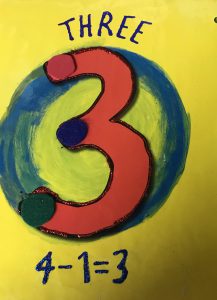
I am three years old. I am three years old. I am three years old.
There is a button on Joey’s AAC device that he can select and it will give us that phrase. I am three years old. When Joey finds this button, he hits it over and over again.
My first thought when he started hitting the button on repeat is that perhaps he likes the idea that he can select one button and a five-word phrase pops out. But after a moment I realized that this constant reminder of his age is not far off from my own three-year-old daughter’s behavior. Being three means, well, you are developing your own sense of self, independence, an understanding that you are different from your parents, and you have different specific traits that separate you from other people in your life.
That’s a nice way to say that, really, when you are three you are obsessed with yourself and really want everyone to know that you are three.
My daughter tells us she is three all the time. Whenever she sees a three or hears the number three, she yells “I’M THREE TOO!” or “THREE LIKE ME!” In a three-year-old’s mind, one can have an instant connection to three apples simply because there are three of them.
Sometimes, when we work with kids like Joey, we forget to consider what a typically developing child is like. The first time Joey hit the “I am three years old” button on repeat, I started to look for a behavioral reason for his actions like “it’s more fun to select that one” or “he’s perseverating on that one button.”
I failed to credit Joey with putting meaning behind his actions because I was looking at Joey through the disability lens. When I look at the behavior this way, my first instinct was to look for a way to get him to stop hitting the button.
Shifting Focus
Yet when I shifted my lens and saw him as I would any three-year-old, I immediately smiled. The behavior made perfect sense. Three-year-olds love themselves, and they love telling us about themselves.
How many of us have done read-alouds to groups of three-year-olds who immediately raise their hands to tell us they have the same color shirt as the one in the book, or want to tell us right away how old they are? It’s what kids this age do.
I love that Joey can remind us that he IS three years old. While he may not be able to complete the motor tasks on the pediatrician’s growth and development checklist, that does not mean he is not progressing as a three-year-old in other ways. Some of what Joey does is not going to be because of his limitations, but because of his strengths. We don’t want to limit his development because we forget to see behaviors as the developmental milestones they are, instead of signs of a problem.


